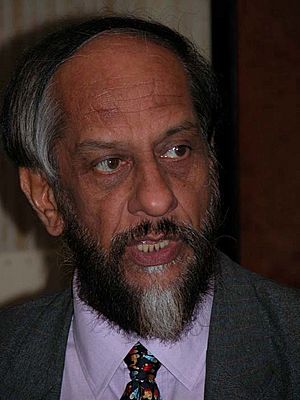Rajendra K. Pachauri facts for kids
Quick facts for kids
Rajendra K. Pachauri
|
|
|---|---|

Pachauri in 2002
|
|
| 3rd Chair of the Intergovernmental Panel on Climate Change | |
| In office 20 April 2002 – 24 February 2015 |
|
| Preceded by | Robert Watson |
| Succeeded by | Hoesung Lee |
| Personal details | |
| Born |
Rajendra Kumar Pachauri
20 August 1940 Nainital, United Provinces, British India (now in Uttarakhand, India) |
| Died | 13 February 2020 (aged 79) New Delhi, India |
| Spouse | Saroj Pachauri |
| Children | 3 |
| Alma mater | La Martiniere College, Lucknow; North Carolina State University (MS 1972, PhD 1974) |
| Occupation | Former Chairman, Intergovernmental Panel on Climate Change, Former Chairman and Director General, The Energy and Resources Institute (TERI) |
| Awards | Padma Vibhushan, Nobel Peace Prize (on behalf of IPCC) |
| Signature |  |
Rajendra Kumar Pachauri (born August 20, 1940 – died February 13, 2020) was an important leader in the fight against climate change. He was the chairman of the Intergovernmental Panel on Climate Change (IPCC) from 2002 to 2015. Under his leadership, the IPCC won the Nobel Peace Prize in 2007. They also created a major report that helped lead to the Paris Agreement, a big international deal to fight climate change.
Pachauri, often called "Patchy," was known around the world for his work on environmental issues. He helped make sure that human-caused climate change was seen as a serious global problem. He also led The Energy and Resources Institute (TERI) in India for over 30 years.
Contents
Early Life and Education
Rajendra Pachauri was born in Nainital, India. He went to La Martiniere College in Lucknow. He also studied at the Indian Railways Institute of Mechanical and Electrical Engineering. This was a special program for future engineers in India.
He started his career working for the Indian Railways. Later, he moved to the United States to study at North Carolina State University. There, he earned two advanced degrees: a Master of Science (MS) in Industrial Engineering in 1972, and a PhD in Industrial Engineering and Economics in 1974. His PhD research was about predicting how much electricity would be needed in certain areas.
Pachauri was a strict vegetarian. He chose this lifestyle partly because of its positive effects on the environment and climate change.
Career Highlights
After finishing his studies, Pachauri taught at North Carolina State University. He also visited other universities to teach about economics and resources. When he returned to India, he joined the Administrative Staff College of India.
In 1982, he became the Director of The Energy and Resources Institute (TERI). This organization focuses on energy, environment, and sustainable development. He led TERI for many years, helping it grow and become a major voice in these fields.
Leading the IPCC
On April 20, 2002, Rajendra Pachauri was chosen to be the Chairman of the Intergovernmental Panel on Climate Change (IPCC). The IPCC is a special group set up by the United Nations. Its job is to gather and assess all the scientific information about climate change.
Pachauri strongly believed that the world needed to act quickly on climate change. He often spoke about the importance of reducing carbon dioxide in the atmosphere. He supported the idea of aiming for 350 parts per million of carbon dioxide. This number is seen by some scientists as a safe limit to avoid dangerous climate changes.
Winning the Nobel Peace Prize

In 2007, the IPCC, under Pachauri's leadership, shared the Nobel Peace Prize with former US Vice-President Al Gore. This award recognized their efforts to spread knowledge about climate change and to lay the groundwork for actions needed to counteract it.
On December 11, 2007, Pachauri gave an acceptance speech in Oslo, Norway. He spoke about the Hindu idea of "Vasudhaiva Kutumbakam," which means "the whole universe is one family." He believed this idea should guide global efforts to protect our planet. He also highlighted the serious risks climate change poses to poor nations, mentioning how rising sea levels could make small island countries disappear. He warned about potential conflicts over resources like water due to climate change.
Lighting a Billion Lives
In 2008, Pachauri started a global project called 'Lighting a Billion Lives' (LaBL). This initiative aimed to bring clean energy, especially solar power, to people in remote and poor areas. It helped many communities in places like the Sundarbans and the Thar Desert in India.
The LaBL project focused on providing clean cooking and lighting solutions. It has helped set up thousands of Integrated Domestic Energy Systems (IDES) in rural areas. This project also encouraged companies to develop and sell clean energy technologies. It has reached over 13 countries and many states in India.
Awards and Recognition
Rajendra Pachauri received many awards for his important work:
- In 2001, he received the Padma Bhushan from the Indian Government.
- He was named NDTV Global Indian of the Year in 2007.
- Nature magazine called him a "News maker of the Year" in 2007. They praised his ability to build and organize important institutions.
- In 2008, he became a UNIDO Goodwill Ambassador.
- He received India's second-highest civilian award, the Padma Vibhushan, in 2008.
- In 2009, Japan awarded him the 'Order of the Rising Sun – Gold and Silver Star' for his work on climate change.
- Foreign Policy magazine listed him among the "Top 100 Global thinkers" in 2009.
- In 2010, the President of Finland gave him the Order of the White Rose of Finland.
- The French government honored him with the 'Officer of the Legion of Honour'.
Other Interests
Besides his scientific work, Pachauri also enjoyed writing. He wrote poetry and even a romance novel called Return to Almora (2010). He also co-wrote a collection of poems with his daughter.
See also
 In Spanish: Rajendra K. Pachauri para niños
In Spanish: Rajendra K. Pachauri para niños
- TERI University
- The Energy and Resources Institute
 | Frances Mary Albrier |
 | Whitney Young |
 | Muhammad Ali |

